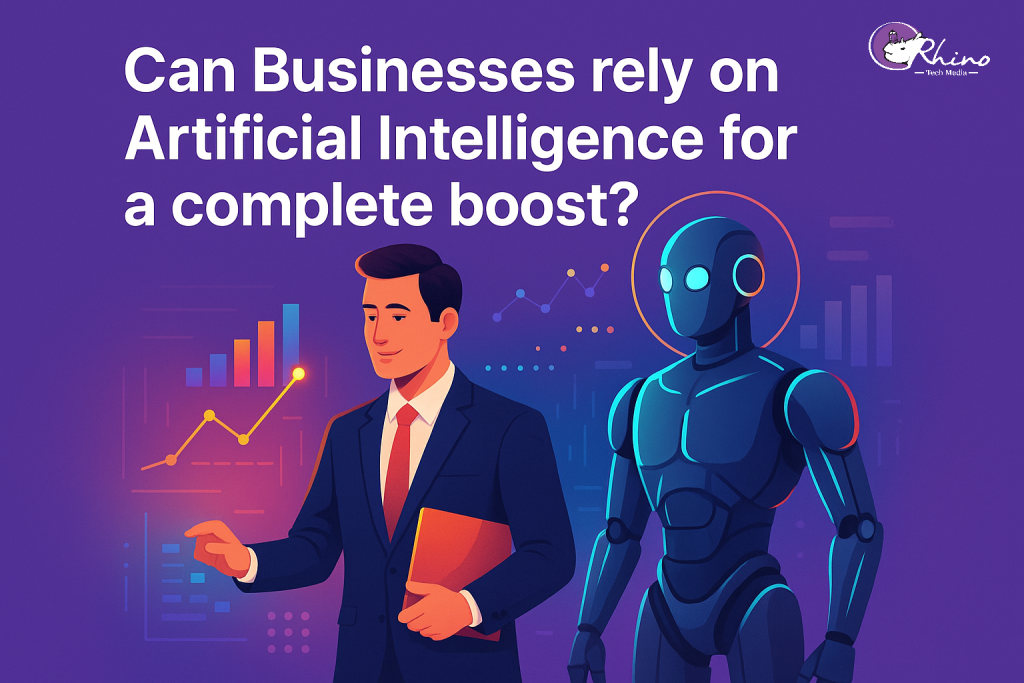Introduction
Artificial Intelligence (AI) has rapidly become one of the most transformative forces in the modern business world. From customer service chatbots to predictive analytics, businesses across industries are adopting AI-driven tools to streamline operations, reduce costs, and enhance customer experiences. However, the question arises: can businesses rely on AI alone for a complete boost? While AI offers remarkable advantages, complete reliance presents challenges that must be carefully weighed.
The Benefits of AI in Business
One of the most compelling reasons businesses turn to AI is efficiency. Automation of repetitive tasks—such as data entry, invoice processing, and customer support—frees employees to focus on more strategic responsibilities. AI also strengthens decision-making through advanced analytics, enabling businesses to identify patterns, predict trends, and respond faster to market changes. For instance, retailers use AI to personalize product recommendations, while manufacturers leverage predictive maintenance to reduce downtime.
Another major advantage is scalability. AI tools can handle large volumes of data and interactions simultaneously, far beyond human capacity. This capability allows businesses to expand their reach and improve customer service without proportionally increasing staff costs. Furthermore, AI contributes to innovation, offering new products and services such as voice assistants, autonomous vehicles, and AI-driven healthcare diagnostics.
The Limitations and Risks of AI
Despite its benefits, AI is not a magic solution. Overreliance on AI systems carries risks that can hinder rather than boost performance. First, AI depends heavily on data quality. Inaccurate, biased, or incomplete data can lead to flawed outcomes, damaging customer trust and decision-making. Second, AI lacks the emotional intelligence and ethical reasoning required in many aspects of business, particularly in human-centered services such as healthcare, counseling, or negotiations.
Security and privacy also remain concerns. Storing and analyzing massive amounts of customer data exposes businesses to cybersecurity risks and regulatory scrutiny. Additionally, implementing AI often requires significant investment in technology and employee training—costs that may be prohibitive for smaller businesses. Finally, AI can disrupt the workforce, leading to job displacement and resistance from employees who fear being replaced.
Striking a Balance
The key to harnessing AI effectively lies in balance. Rather than relying on AI for a complete boost, businesses should integrate it strategically as a supportive tool. Human oversight, ethical guidelines, and continuous monitoring are essential to ensuring AI aligns with business goals. Companies that combine AI’s computational power with human creativity, empathy, and judgment are more likely to succeed. For example, AI can analyze vast customer datasets, but human marketers still need to craft compelling stories that resonate emotionally.
Conclusion
Artificial Intelligence is undoubtedly a powerful driver of business growth and transformation. It enhances efficiency, scalability, and innovation, offering opportunities that were unimaginable a decade ago. However, businesses cannot depend solely on AI for a complete boost. The risks of overreliance—data biases, ethical concerns, security threats, and loss of human touch—make it clear that AI should be viewed as a partner rather than a replacement. Ultimately, the businesses that thrive will be those that strike the right balance: leveraging AI’s strengths while preserving the uniquely human qualities that technology cannot replicate.

